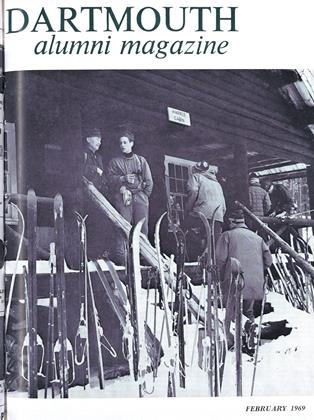In Towards a Better America (Macmillan, 300 pages, $5.95), 37 Americans address themselves to the problems of Civil Rights, Civil Liberties, Public Welfare, and Foreign Affairs. The volume is edited by Howard D. Samuel '46, Executive Director of the Sidney Hillman Foundation and Vice President of the Amalgamated Clothing Workers of America with which the Foundation is affiliated. His previous books include Congress at Work, written with Stephen K. Bailey, and Government in America, written with Mr. Bailey and Sidney Baldwin. Among the contributors in Towards a Better America is George F. Kennan, who in 1950 when he was at the Institute for Advanced Study at Princeton received an LL.D. from Dartmouth. The former Ambassador to the Soviet Union discusses "The Illusion of Total Security." In his introduction Mr. Samuel quotes Sidney Hillman who shortly before his death wrote, "We want a better America, an America that will give its citizens, first of all, a higher and higher standard of living so that no child will cry for food in the midst of plenty... an America where the inventions of Science will be at the disposal of every American family... an America that will have no sense of insecurity and... make it possible for all groups regardless of race, creed or color to live in friendship... an America that will carry its great mission of helping other countries help themselves."
Under the auspices of the Columbia University's Institute of Latin American studies, Gregory Rabassa '44, Professor of Romance Languages at Queen's College, City University of New York, has translated An Introduction to Literature in Brazil by Afranio Coutinho of the Brazilian National Academy of Literature and Professor of Brazilian Literature at the University of Brazil in Rio de Janeiro. A handsome volume costing $10, with 254 pages of text, 43 of notes, 16 of bibliography, and a name index, it consists of the collection of introductory essays which Professor Coutinho has supplied to the various divisions of the four-volume work, A Literatur no Brazil, containing the contributions of various specialists under his general editorship. The author desires "to establish a new order and hierarchy of values, a revaluation and reinterpretation of Brazilian literature based on a proper gathering of facts... established and suggested by research and current critical thought. Following the patterns recommended by Wellek, it attempts to avoid an 'excessive determinism that reduces literature to the mere passive mirror of other human activities,' concentrating, though without extremes, on the study of the work itself, in the light of an esthetic theory of literature and literary history."
In the New Monthly Magazine [London] of April 1, 1819 appeared a Gothic short story, "The Vampyre; a Tale by Lord Byron." It was a smashing success: five printings in a few months, Paris edition in English, translations in French and Italian, rewritten as a play with stage performances in Paris and London, and the basis of an opera produced in German, English, Russian, Dutch, and French. Actually the author was Byron's traveling physician, John William Polidori, M.D., but Henry Colburn, the editor of the magazine, deliberately and fraudulently used Byron's name to promote the sale of his magazine and the book with the same title which followed immediately. Owing to the lack of a magazine copyright, "The Vampyre" was reprinted in America by three publishers. With appropriate comments, Henry D. Viets '12, M.D., writing from the Francis A. Countway Library of Medicine has reproduced the three title pages of the three printings in The Papers ofthe Bibliographical Society of America, Volume 62, Third Quarter, 1968.
 View Full Issue
View Full Issue
More From This Issue
-
 Feature
FeatureTHE UNSUNG HERO OF THE DARTMOUTH COLLEGE CASE
February 1969 By Susan Liddicoat -
 Feature
FeatureThe Bearing of the Green
February 1969 By Mary B. Ross ('38) -
 Feature
FeatureA Call for Equal Opportunity
February 1969 -
 Feature
FeatureA Student View of the Crisis, 1816-19
February 1969 -
 Article
ArticleTrustees and Alumni Council Meet
February 1969 -
 Article
ArticleThe Undergraduate Chair
February 1969 By CHRIS KERN '69
J.H.
Books
-
 Books
BooksThe Crow's Nest
March 1935 -
 Books
BooksDeaths
June 1948 -
 Books
BooksShelflife
Nov/Dec 2005 -
 Books
BooksALBERT INSKIP DICKERSON: SELECTED WRITINGS
November 1974 By JAMES L. FARLEY '42 -
 Books
BooksCAN ENGINEERS SAVE US? TOWARD CIVILIZATION
April 1931 By Luther H. Evans -
 Books
BooksDetours (Passable but Unsafe)
May, 1926 By R. C. N.








